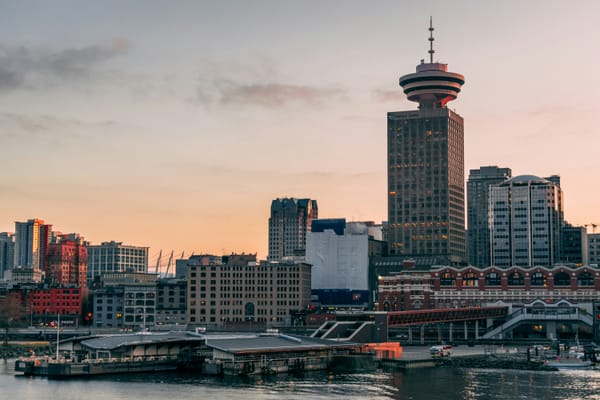11 (rough) notes on the state of Vancouver tech
How you feel about the local ecosystem is a matter of perspective.

“It’s a strange time,” I mused about the local tech scene in January. “Vancouver can feel like a shooting star–at once soaring, heating up, but always on the verge of burning out.” I still feel the same way a year later, but speakers at a recent Vancouver Tech Journal event were more optimistic.
I went. I watched. I took notes. And the points below are what I found most interesting from the discussion. Thanks to Anastasia Hambali from Boast for leading such a compelling conversation. The local leaders she was conversing with are quoted throughout this post.
1 Tough choices lead to better outcomes
The BC Tech Association is perhaps the community's most well-known tech trade group. Its associates include a mix of home-grown successes like Launchpad and many big tech players like Microsoft and SAP. Against a backdrop of choppy markets and global turmoil, BC Tech's members are approaching the future with “creativity and innovation in hand with some challenging decisions,” explained Erika Borgenson, VP of marketing at the organization. Based on conversations with members, she thinks people and companies will end the year stronger and more focused.
For example, General Fusion is forging ahead under different circumstances than envisioned, Borgenson said. In 2021, the energy startup announced it would build a $400 million facility in England. But this summer, chief executive Greg Twinney said that the project is now on hold. “We are a building a new machine in Vancouver that reflects current market conditions and also where we’re at as a company from a technology development perspective,” Twinney told the Globe and Mail in August. Now four months later, Borgenson said that it’s likely the smaller-scale facility, located near YVR, “will get them to commercialization faster.”
“Kind of being forced to make tough decisions sometimes can take you on a better path,” she added.
2 Worse than the dot-com bust
Still, Rob Goehring, CEO of Wisr.ai, could not overstate the extent of difficulties startups are facing right now. In the AI space, which he’s focused on, there is widespread momentum and investment. However, he cautioned, “outside of that, there have been a lot of challenges.” Goehring admitted that he was older than most people in the audience; he experienced the dot-com boom and bust. “That was brutal,” he confessed. But he then added, “this is worse in terms of people I know personally that actually had to shut things down.”
3 Yes, but a welcome correction
Are so-called downturns like this good or bad? Yes? The market has forced founders to refocus and cut burn, explained Devon Thompson, managing director at RBCx. However, she said the economic environment’s turn for the worst has lasted longer than most predicted. Moreover, it caught a new generation of founders who were used to free money off guard. “A lot of founders have been building companies post 2008, where interest rates were steady and low,” Thompson explained. “And now it's a really different environment. So you have to get much more creative… and there are a lot of different boardroom discussions on paths to profitability and getting back to fundamentals. It's been a welcome correction, frankly, to the ecosystem in general. I would say it's hard but needed for sure.”
4 Strength in agtech and cleantech
Not all startups are sinking. In addition to early AI ventures, later-stage companies with strong fundamentals are still raising capital. Procurify, Koho and Fantuan are three recent examples. BC’s clean and agtech firms are also bright spots in the ecosystem, Thompson said. “I think about pH7 and 4AG – these are really exciting cleantech and agtech companies,” she noted. The capital pool for these types of firms is growing too. Active Impact Investments is a cleantech VC targeting a $120 million seed fund. Its managing partner Mike Winterfield recently revealed that $70 million is already secured. “It's really exciting in specific verticals, and we're seeing it across Canada now,” said Thompson “But not all verticals are created equal.”
5 The best founders get money
Forget stage or vertical–the top entrepreneurs get funded, according to Adarsh Pallian, founder of Kismet VC, which invests in early-stage companies. “There's no question about it,” he claimed. “The valuations may come and go, but those [founders] will get funded.” What Pallian is more concerned about, however, is Vancouver’s ability to keep the best. “I've seen, unfortunately, some of the most ambitious founders leave the city. And it could just be pure ambition… no matter how much money you throw at them. How do we fix that? How do we retain that talent?” None of the panellists could suggest obvious cures for the ailment of emigrating entrepreneurs. They had more things to diagnose, however.
6 A question of exits
When it came time to discuss Vancouver’s standing vis à vis other ecosystems, Pallian said Vancouver is still behind. Why? Among other factors, he said that “we haven't had a lot of great exits in the city.”
His comments echoed an argument made by Ian Vanagas. In addition to the cost of living, brain drain, and risk-averse investors, Vanagas believes BC’s startup scene struggles due to a lack of liquidity events. “When you look at BC’s biggest startups over the past 20 years,” he’s written, “you see a lot of mature companies that raised a bunch of money, grown their teams, and built successful businesses but haven’t managed to make it to a liquidity event.”
Exhibits A to H, in his view, include Hootsuite, Bench, Dapper Labs, Trulioo, Visier, Clio, Semios, and Dooly.
Yes, but: There is an alternative perspective or, at the very least, a caveat, which RBCx’s Thompson acknowledged on stage, which is that many of the biggest liquidity events have been niche. Case in point: 2023’s biggest BC exit was Chinook Therapeutics, a biotech company acquired for USD $3.2 billion. It’s some serious coin, but perhaps not the flavour of coin that will be redeployed across the province as early-stage investments.
But Chinook is not the only major deal worth noting from the past few years. AbCellera’s USD $555 million IPO was in 2020. And then um… see this non-exhaustive list: Next Level Games (acquired by Nintendo, 2021), Beanworks (Quadient, 2021), Galvanize (Diligent, 2021), Photon Control (MKS Instruments, 2021), Teradici (HP, 2021), Precision NanoSystems (Danaher, 2021), Allocadia (BrandMaker, 2021), Tasktop Technologies Inc. (Plainview, 2022), Later (Mavrck, 2022), Canalyst (Tegus, 2022), Traction on Demand (Salesforce, 2022), and Carbon Engineering (Occidental Petroleum, 2023).
Okay, so there have been a few Vancouver transactions, but as Vangas and the panellists concluded, not all liquidity events are created equal. And to be sure, we won’t know the true impact of those deals for some time.
What we do know right now is that the majority of BC startups struggle to grow up.
7 A lack of scale
Our companies don’t scale, explained Borgenson, and it wasn’t her opinion. BC Tech’s data shows that only 2% of BC tech firms reach 100 employees or more. Why does that matter? Because it’s at that scale that the IP and infrastructure of the firm will likely stay in the province, even if the company is acquired by an international suitor, Borgenson outlined.
This is a policy area where BC Tech has been vocal. “We want to find ways as an association that we can help companies on that journey,” Borgenson said. “We do a lot, and we want to do more.”
8 Support to start is better than ever
The good news for entrepreneurs is that support is more accessible than ever. It used to take secret codes and handshakes to find someone to help or fund your startup, recalled Goehring. In contrast, many resources are now available, like the new funding database Capital Compass. “There’s a huge sea change that’s happened here,” Goehring noted, “which is really, really great.”
So what’s holding Vancouver startups back?
9 A matter of mindset
For starters, Vancouver founders need to think bigger. In calls with US investors, Goehring shared that he’s heard different variations of one message: “We find when we invest in Vancouver companies, they don't know what great is.” Let me repeat that these were not Goehring’s words; it’s what he’s been told. Vancouver has amazing people and businesses, but the city lacks something “compared to other communities that have really achieved breakout success.” Goehring questioned if there’s a glass ceiling that locals have imposed on themselves. “There are amazing people, but there is a bit of a psychology issue or something that's preventing things from really, really growing here,” he added.
It’s worth questioning the initial point, however. What is greatness, and who gets to define it? Surely it’s a matter of perspective.
10 Navigating a global hiring market
Vancouver entrepreneurs and Silicon Valley founders may not want the same things in life. But where their paths will likely converge and brush up against each other is the global war for talent.
“No one is hiring just in Vancouver,” insisted Thompson. A week before in Victoria, she had gathered 20 CEOs in a room and asked them about the hiring pool. They laughed in her face. Not as a knock against the capital's talent, but because they know that to grow their firms, they must look beyond their own community and borders. “They said, ‘There's no way we are looking in just Victoria or Vancouver, BC,” Thompson recalled. “It is now a global talent pool. You are competing against global companies that are very big, and that can pay really interesting amounts*, and that have long-term careers for employees.”
(*"interesting amounts" aka Way More Money)
So how can a BC company pitch top talent and compete against a US company paying triple? Thompson acknowledged that “it’s really tricky. You have to understand, as founders, what the vision is. How do I connect to the values of that employee? How do I help them feel anchored? And how do I help them feel a part of this vision and that they have a stake in this company and that they feel invested with me?”
“But great talent is out there right now,” Thompson continued. “I would say with the layoffs comes opportunity on grabbing up some very, very experienced talent.”
11 The year ahead: Good things to come to those who wait?
Talent availability is one of the silver linings of this moment. Crisis means opportunity, right? How tech leaders feel in this environment perhaps comes down to attitude and belief (and yes, the direction of interest rates…). When it comes to 2024, the panellists, for their part, have a positive outlook for the local innovation economy.
Thompson is “optimistic and hopeful.” Pallian said, “Things are not as bad as you think.” And Goehring said he feels “like everyone's kind of getting tired of feeling tired. And I think there'll be a turning point next year, and we'll be back to the races.”
BC Tech’s Borgenson, a parent, considered how Vancouver tech would be evaluated as a school student. Grades are no longer given in elementary schools, she explained. Instead, they judge kids on four levels of understanding. The tiers are: emerging, developing, proficient, and sophisticated.
Borgenson thinks the ecosystem is proficient. “We have a lot of strength, and I'm optimistic about 2024,” she said. “I don't think it'll be easy. I don't think 2023 was easy either. But I also think we've gone through challenging times just three years ago. In fact, when we went through COVID, we thought the world would end, and innovators continued to innovate. Our green economy is going to continue to grow, not slow down. So I do feel optimistic about the year ahead.”




